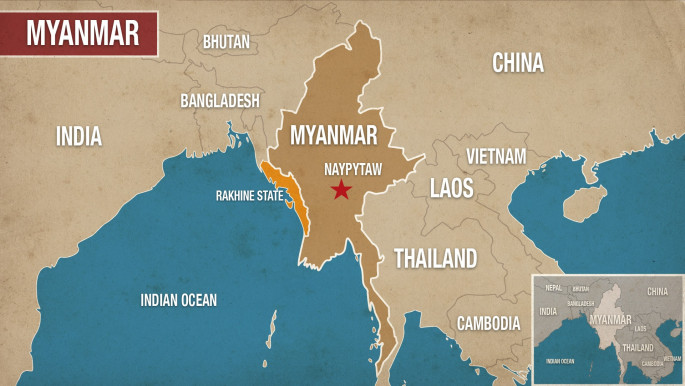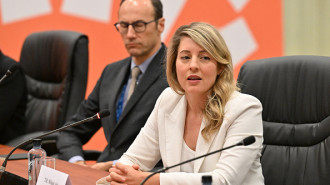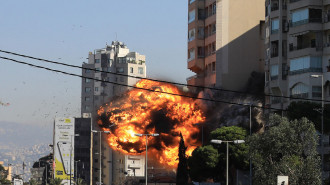Myanmar leader cancels UN trip amid worsening Rohingya crisis
Myanmar leader cancels UN trip amid worsening Rohingya crisis
Myanmar's de facto leader Aung San Suu Kyi will not attend the UN General Assembly later this month as criticism of her handling of the Rohingya crisis grows.
2 min read
Aung San Suu Kyi has faced strong international criticism over the Rohingya exodus [Getty]
Myanmar's de facto leader Aung San Suu Kyi has cancelled a trip to the United Nations in September amid a worsening crisis inside the country's Rakhine state.
Almost 400,000 minority Muslim Rohingya have fled to Bangladesh to escape violence since August 25, according to the United Nations, an average of almost 20,000 a day.
A spokesman for the presidential office said she had called off her trip for two reasons.
"One is the current situation in Rakhine State. We have terrorist attacks and also there are many works on public safety and humanitarian works," spokesman Zaw Htay said in a statement.
"And the second reason is we have received reports that there are possibilities of terrorist attacks in our country."
The 72nd UN General Assembly opened in New York on Tuesday and events are expected to last for weeks to come, including a speech by US President Donald Trump.
Civilian leader Suu Kyi, a Nobel peace prize laureate, has faced strong international criticism over an army crackdown on the Muslim minority, which began when Rohingya militants ambushed security forces in Rakhine State last month.
On Monday the UN human rights chief, Zeid Ra'ad al-Hussein, accused Myanmar of waging a "systematic attack" on Rohingya civilians and warned that "ethnic cleansing" seemed to be under way.
"Because Myanmar has refused access to human rights investigators the current situation cannot yet be fully assessed, but the situation seems a textbook example of ethnic cleansing," he told the UN Human Rights Council.
The United Nations Security Council will meet on Wednesday, at the request of the United Kingdom and Sweden, to discuss the ongoing crisis inside Rakhine State, which the organisation says has left at least 1,000 dead.
The UN has also on Wednesday sought a "massive" aid boost to deal with the unprecedented flow of desperate Rohingya fleeing across the border from Myanmar into Bangladesh.
"We have an emergency within an emergency with conditions in existing camps," George William Okoth-Obbo, assistant high commissioner for operations at the UN refugee agency, told Reuters during a visit to the Kutupalong refugee camp in Bangladesh.
Agencies contributed to this report.
Civilian leader Suu Kyi, a Nobel peace prize laureate, has faced strong international criticism over an army crackdown on the Muslim minority, which began when Rohingya militants ambushed security forces in Rakhine State last month.
On Monday the UN human rights chief, Zeid Ra'ad al-Hussein, accused Myanmar of waging a "systematic attack" on Rohingya civilians and warned that "ethnic cleansing" seemed to be under way.
"Because Myanmar has refused access to human rights investigators the current situation cannot yet be fully assessed, but the situation seems a textbook example of ethnic cleansing," he told the UN Human Rights Council.
The UN has also on Wednesday sought a "massive" aid boost to deal with the unprecedented flow of desperate Rohingya fleeing across the border from Myanmar into Bangladesh.
"We have an emergency within an emergency with conditions in existing camps," George William Okoth-Obbo, assistant high commissioner for operations at the UN refugee agency, told Reuters during a visit to the Kutupalong refugee camp in Bangladesh.
Agencies contributed to this report.
![Aung San Suu Kyi [Getty] Aung San Suu Kyi [Getty]](/sites/default/files/styles/large_16_9/public/media/images/DD54DC18-41DB-4EF0-947A-948E08C7A33E.jpg?h=d1cb525d&itok=PQaisJxQ)







 Follow the Middle East's top stories in English at The New Arab on Google News
Follow the Middle East's top stories in English at The New Arab on Google News


